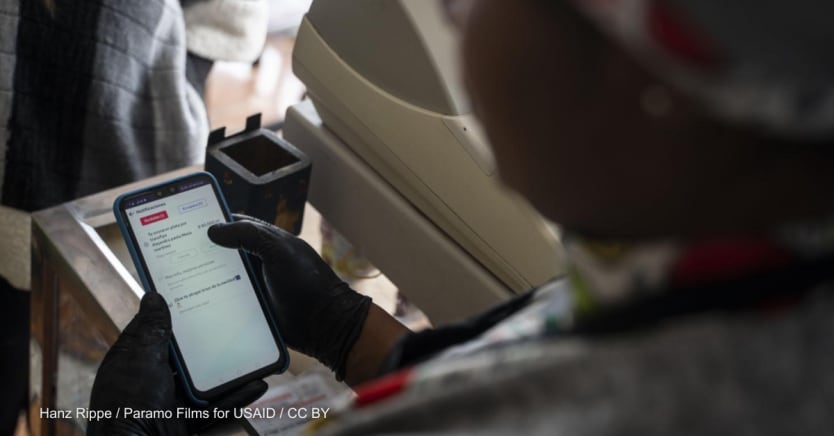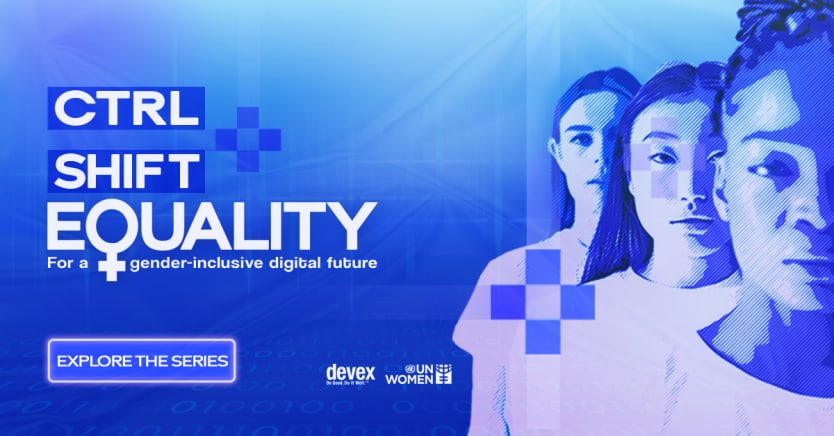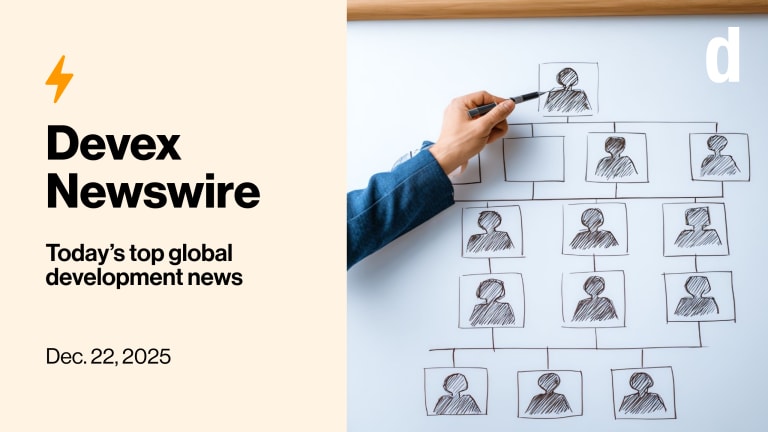What's needed for digital finance to reach women in conflict zones

Just before the war in Sudan broke out in April last year, the nongovernmental organization Women Advocacy and Development Initiative, or WADI, was working with women street vendors and small farmers to advance women’s rights and participation in civic and political life.
“We had some cooperatives for farmers and women street vendors working in a group to try to market their products. … now we have to rethink everything,” said Salwa Elsadik, the organization’s founder.
Since the war broke out, there are very limited opportunities for women to earn a living.
“People in Sudan are now on the 14th month without salaries. So you can’t survive unless you have someone abroad who sends you some money,” Elsadik said. To help women generate an income, the NGO has set up community kitchens where women make traditional food to sell on the street. “This is the only way to do it now. Even the state where we are isn’t completely safe.”
Women in conflict areas are 7.7 times more likely to live in extreme poverty, and in Sudan millions of women have lost their livelihoods and savings, limiting access to food and essential health care. The economic impact of the conflict has further marginalized women, leaving many with few other options than resorting to sexual exploitation as they seek to support their families.
However, women are not only victims of war, but often the first responders to crises in their communities. And with access to financial services, they could do even more. According to the World Food Programme, the situation for the millions of women and girls currently living in conflict-affected areas worldwide could be vastly different if they had access to digital financial services such as payments, savings, loans, and insurance.
Though “banking the unbanked” has been a buzzword in global development for decades and digital financial services often hailed as a silver bullet to digital inclusion, little progress has been made to ensure women in conflict and post-conflict settings have access to digital financial services.
“Policies take a long time to reform and redesign, but in conflict zones, regulators and policymakers need to be quick and agile.”
— Ammar Hamadien, co-founder and chairman, Sudan FinTech Association.“The primary difference between conflict zones and peaceful countries, when you look at designing products for fintechs or mobile financial services, is the crumbling down of the banking infrastructure and the telecom infrastructure, which are the two pillars that any fintech product stands on,” said Ammar Hamadien, digital finance expert and co-founder and chairman of the Sudan FinTech Association.
Post-conflict, the priority for countries should be a list of lessons learned, he explained.
“Why did the banking sector collapse? Why did the telecommunication infrastructure collapse? ... We need to take stock of what caused this and then move into institutional reforms, including in the banking and ICT sectors, in case it happens again,” he said.
There’s typically a long lag time between technology and regulation. Even if fintechs innovate and design gender-specific products, they are hit with a wall of regulations that do not allow them to launch these products on the market, Hamadien explained.
“My advice to governments is to keep modernizing policies and regulations. … You cannot try to regulate a product designed in 2024 with policies that are from the 1990s,” he said, adding that heavy-handed regulations are currently stifling the growth of the fintech sector in Sudan and preventing people from accessing financial services.
Stringent ‘know your customer’ processes
In order to open a bank account, most institutions require individuals to present themselves in person at an office with their government-issued ID and documents such as their credit history. In the banking sector, this is called the “know your customer,” or KYC, process.
But many people who have fled conflict don't have these documents because they left their homes at a moment's notice, Hamadien explained. Light-touch policies to enable digital KYC processes without individuals having to travel long distances to a physical location would remove a lot of barriers for people in conflict settings.
“Policies take a long time to reform and redesign, but in conflict zones, regulators and policymakers need to be quick and agile,” he said.
While digital financial services can be offered both by traditional banks as well as privately owned fintech companies — mostly startups — the only digital financial service widely used in Sudan today is Bank of Khartoum’s Bankak app.
“That one bank has almost more than 40% of the market share and currently dominates more than 95% of the transactions that are happening,” said Yousif Yahya, founder and managing director of Savannah Innovation Labs, a Sudanese startup incubator.
Because of stringent KYC processes, anybody outside of state capitals is unable to access banking services unless they can reach bigger cities to set up a bank account in person.
“If the men in these [rural] areas are not able to access these services, then the women themselves are not going to do so,” he said, adding that there’s a need to innovate the ID system so that banks are able to capture customer information digitally.
The potential pitfalls of banking online
For Yahya, none of the banks in Sudan are actually trying to innovate, and fintechs are key to finding new ways to onboard and reach customers online. “If you just scrap the [bank] branches and enable people to use technology in order for them to be onboarded, then you're unlocking the financial system to a lot more people,” he said.
However, internet access is another barrier. Sudan is a vast country with a predominantly rural and young population — only 15% of whom hold a bank account. Meanwhile, 77% of the population had access to a mobile phone in 2019, yet only about 28% were connected to the internet in 2023. As gender-disaggregated data does not exist, according to Yahya, it is impossible to know how many of those users are women.
Internet access has been severely disrupted since the war broke out in April 2023, and internet services provided by traditional telecom companies only work in parts of the country with spotty coverage, Yahya explained. Those who need a stable connection and can afford it use Starlink, which provides internet through satellite connectivity.
Low digital literacy remains a challenge and a risk for many women, with around 35% of women mobile money account holders in sub-Saharan Africa reporting they cannot use their account without help from a friend or agent, which makes them more vulnerable to fraud. Prioritizing capacity building and making sure that digital literacy is at the heart of government policies is key for mitigating any physical and financial risk for women, Hamadien explained.
To reach more women in these settings, fintech companies should design their products to work on low-tech or older phones, rather than only high-tech smartphones, Hamadien said, adding that the companies should also embed gender-responsive design in their products.
We normally see a disparity with financial products more focused toward men than women, he said, and “addressing that disparity should be a joint responsibility between the public and private sector in every country.”
Generation Equality
Generation Equality is the world’s leading effort to unlock political will and accelerate investment and implementation on gender equality. Launched at the Generation Equality Forum in 2021, the action coalitions are innovative, multistakeholder partnerships mobilizing governments, civil society, international organizations, and the private sector around the most critical areas in gender equality to achieve concrete change for women and girls worldwide. Ctrl Shift Equality is a partnership with two of the coalitions: Technology and Innovation for Gender Equality, and Gender-Based Violence.
Further efforts are also needed to license and regulate small merchants and agents — be it a local grocery shop or kiosk — to act as cash out and cash in outlets. In many conflict zones and remote areas, intermediaries make a lot of money out of these transfers, according to Hamadien.
“If you send $1 and you go to cash it out with a non-licensed distributor, you could only receive 70 cents because they take a big part as commission,” Hamadien said.
Unlocking financial opportunities for refugees
It is also important to look at long-term financial solutions post-conflict, particularly focusing on how refugees and displaced communities can “generate livelihoods, find economic opportunities, and rebuild their lives,” said Lev Plaves, investment director at Kiva, a nonprofit working to expand financial access through a crowdfunding platform. Around 80% of Kiva’s borrowers are women, according to Plaves.
The periods during and after conflict present opportunities for women to take on new roles in the economy as traditional gender norms change and household incomes decline, and post-conflict areas where women are more empowered also experience more rapid economic recovery and poverty reduction, according to the Georgetown Institute for Women, Peace and Security.
Yet refugees continue to be one of the most financially excluded populations in the world, as lenders fear they won’t be able to repay, Plaves explained.
Since launching their refugee program in 2016, Kiva found that refugees are repaying their loans at the same, if not higher, rate than nonrefugee borrowers, with a repayment rate of 96%, according to Plaves.
He sees a unique opportunity for fintechs to serve the needs of refugees. “Lending to refugees is not only viable, but it makes business sense. We would love to see more traditional larger banks really start doing this work as well,” he said.
Update, June 27, 2024: The article was updated to reflect the correct percentage of Kiva’s women borrowers and that the refugee program began in 2016.
Visit Ctrl Shift Equality — a series produced by Devex in partnership with UN Women and the Generation Equality Action Coalitions on Technology and Innovation for Gender Equality, and Gender-Based Violence.
To learn more about the multi-stakeholder commitments made to the Generation Equality Action Coalitions, click here.

Search for articles
Most Read
- 1
- 2
- 3
- 4
- 5








